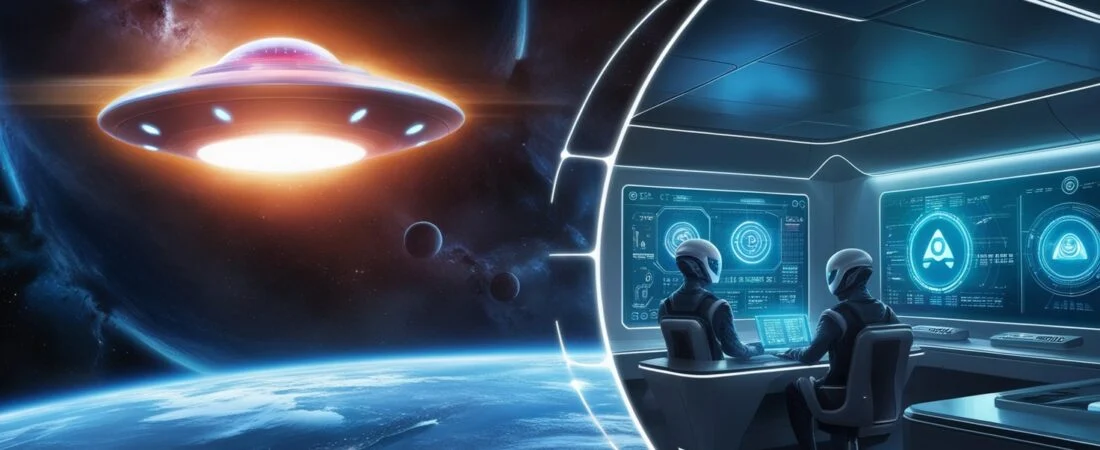Listen on Spotify
Listen on Apple Podcasts
Unveiling the Unknown: Are We Alone in the Cosmos and What Lies Ahead for Artificial Intelligence?
As we step into 2025, humanity finds itself at the crossroads of two profound mysteries: the possibility of extraterrestrial life and the rapid evolution of artificial intelligence (AI). Both challenge our understanding of reality and hold the potential to reshape our future in ways we can scarcely imagine. From the startling revelations of UFO sightings to the tantalizing promise of Artificial General Intelligence (AGI), these dual narratives invite us to ponder the unknown and confront the implications of our technological and cosmic endeavors.
Part 1: Are We Alone in the Cosmos?
The Surge in UFO Sightings
2024 saw an unprecedented rise in UFO and UAP (Unidentified Aerial Phenomena) sightings across the globe, with reports of strange aerial phenomena dominating headlines. In Mountain Center, California, a military-trained observer described a glowing oval light hovering silently above the treetops, emitting no heat or sound. In Oregon, pilots reported red circular lights darting across the sky, defying conventional explanations.
These sightings have sparked renewed debates about the existence of extraterrestrial life, fueled by testimony from figures like Luiz Elizondo, former head of the Defense Department’s Advanced Aerospace Threat Identification Program (AATIP). Elizondo’s bold statement—“We are not alone in the cosmos”—has only deepened public fascination with these enigmatic encounters.
Government Transparency and Investigations
Congressional hearings, like the 2024 session titled “Unidentified Anomalous Phenomena: Exposing the Truth”, sought to demystify these phenomena. Elizondo and journalist Michael Shellenberger called for greater transparency, accusing elements of the government of withholding critical evidence. While agencies like the FAA and FBI attribute many sightings to drones and other man-made objects, whistleblowers argue that not all incidents can be so easily dismissed.
Theories of Extraterrestrial Contact
Could these sightings be evidence of advanced alien civilizations monitoring or even interacting with Earth? Some believe these objects exhibit capabilities beyond human technology, such as erratic movements and speeds that defy physics. Skeptics, however, caution that many sightings may stem from misidentified drones or natural phenomena. Yet, the growing number of credible witnesses suggests that the truth may lie somewhere between skepticism and belief.
Part 2: The Journey Toward Artificial Intelligence
The Evolution of AI
Artificial Intelligence has transformed from a tool for simple computational tasks to a field on the brink of creating machines capable of human-like cognition. Current AI, like ChatGPT, represents the Reasoning AI stage, where systems can generate complex responses based on patterns in vast datasets. However, the ultimate goal remains the development of Artificial General Intelligence (AGI), a machine with the versatility and adaptability of the human mind.
The Promise of AGI
AGI could revolutionize fields like healthcare, climate science, and global logistics by solving problems far beyond human capacity. Imagine AI diagnosing diseases with unmatched precision, devising strategies to combat climate change, or optimizing global food distribution networks. The potential is both staggering and inspiring.
Ethical Challenges and the Singularity
As AI progresses toward AGI and the theoretical Singularity, where machines enhance themselves autonomously, ethical questions loom large. How do we ensure AI aligns with human values? What safeguards can prevent misuse by bad actors? The Singularity could bring unparalleled advancements—or uncontrollable risks.
Part 3: Bridging the Cosmic and the Computational
AI and the Search for Extraterrestrial Life
Advanced AI systems are already aiding in the search for alien life, analyzing vast datasets from telescopes and satellites to identify potential biosignatures on distant planets. The James Webb Space Telescope’s recent discovery of organic molecules on exoplanets highlights how AI can process the enormous volumes of data required to uncover these cosmic clues.
The Intersection of Two Frontiers
What if AI itself becomes a means of interstellar communication? If alien civilizations possess technologies far beyond ours, could they recognize Earth’s progress through our advancements in AI and quantum computing? Such possibilities blur the lines between science fiction and reality, urging us to prepare for encounters that could redefine existence.
FAQs: Exploring the Unknown
UFOs are Unidentified Flying Objects, while UAPs are Unidentified Aerial Phenomena. Both terms describe objects or lights in the sky that defy easy identification.
Artificial General Intelligence is an advanced form of AI capable of understanding and performing any intellectual task that humans can do.
AI is already assisting in analyzing data for potential alien life. Its ability to process complex information quickly could play a key role in future discoveries.
Risks include ethical misuse, job displacement, and the potential loss of control if AI surpasses human intelligence without proper safeguards.
The Singularity refers to a point where AI can improve itself exponentially. While it could lead to incredible advancements, it also raises fears of unpredictable outcomes.
Conclusion
As we explore the vast mysteries of the cosmos and the boundless potential of artificial intelligence, humanity stands at the threshold of a transformative era. The convergence of these two narratives—extraterrestrial discovery and AI evolution—challenges us to consider the profound implications of our place in the universe.
Are we prepared to encounter alien civilizations or witness machines surpassing human intelligence? These questions remind us that the journey toward understanding the unknown is as thrilling as it is uncertain.

